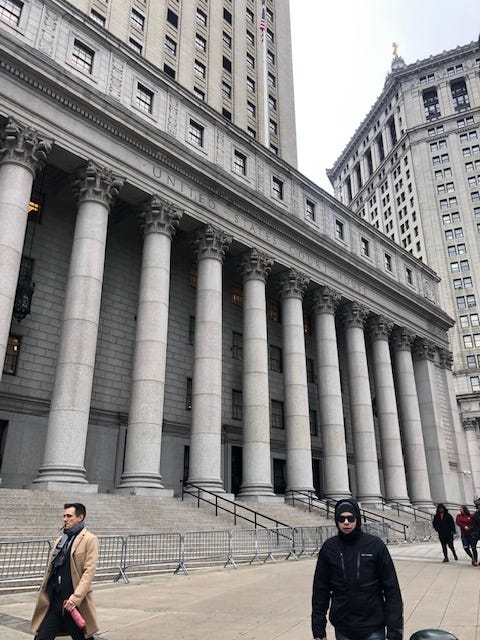Exxon tells the courts that corporations are people too — and that the rest of us can eat cake
The company is trying out a new strategy to avoid accountability.

Thurgood Marshall United States Courthouse, NYC, where this week Exxon’s appeal of an earlier decision dismissing its lawsuit against Massachusetts and New York AGs was heard. Credit: Emily Sanders (me)
First: if you haven’t subscribed for a weekly edition of EXXONKNEWS yet, you can do so right here.
If you already have, though, you’ll remember how Exxon executives spent millions of dollars spreading climate denial, even though they had detailed knowledge of the existential threat that climate change would pose to humanity and the planet.
Well a few years back, with tons of evidence of that deception campaign having recently been exposed, the attorneys general of New York and Massachusetts launched separate investigations into whether the company misled investors and the public about the findings of their own research on climate change (and the effects it might have on their business).
Based on their findings, both states filed lawsuits against Exxon. New York AG Schneiderman (and then AG James) charged Exxon with committing investor fraud by essentially cooking the books on the risks the company faces from climate regulation, but that suit was dismissed in December 2019 (the state has said it will not appeal). Massachusetts AG Healey, meanwhile, filed a separate lawsuit alleging both consumer and investor fraud, and that case is still ongoing.
And did Exxon take this all lying down? Of course not. Two years ago, the company retaliated with its own lawsuit against both attorneys general, claiming their investigations were politically motivated, brought in bad faith, and yes, intended to chill the oil giant’s free speech. According to Exxon, the investigations were a coordinated effort by attorneys general to coerce the company into reforming its stated views on climate change, stripping away their social and political freedoms in the process.
In March of 2018, U.S. District Judge Valerie Caproni dismissed Exxon’s lawsuit with prejudice — meaning the same claims can’t be brought by the company again.
Exxon, again, not known for taking things in stride, came back with an appeal seeking to reverse the judge’s dismissal. The company’s arguments were heard this Tuesday (February 18) before the Second Circuit in a Manhattan courthouse, meaning I got to see the whole ordeal in person. Here’s what I witnessed:
Exxon is scared $#*&-less, and is not hiding it well.
In court on Tuesday morning, Exxon argued that by merely collecting internal documents via investigation, the attorneys general infringed on the company’s freedoms because, and I quote, “we don’t know what they’re going to do with them.”
Apparently, I was not alone in finding Exxon’s ask from the court to be… unclear. One of the three judges on the panel asked: “They [the attorneys general] have already seen the documents. Do we need to sort of whitewash their brains somehow? Is that the relief you’re seeking?” (Zing!)
At this point, Exxon is making a spectacle of just how afraid they are that the full extent of their deception will be exposed, and that they will finally be held accountable in court. Their strategy is to intimidate and punish anyone who dares bring a lawsuit against them, or even look twice at their foul behavior, which is no surprise for a company that has peddled in deceit and disinformation for half a century or more. Like any schoolyard bully, backroom mobster, or unchecked tyrant, they’re trying to send a clear message: mess with me, and we will make your lives very, very difficult.

Credit: Giphy
Remember, these investigations are a done deal — two lawsuits have been filed in their aftermath. So what is the company trying to do? The judges asked what would prevent every corporation investigated for fraud from taking the same approach. Exxon’s response, and what they say differentiates the case, is that these investigations are part of a “conspiracy” between climate activists and the state attorneys general to punish the company for its positions on climate policy (or lack thereof).
This isn’t the first time we’ve seen Exxon attempt to dodge accountability with distractions, retaliatory lawsuits, and strawman arguments galore. They’ve tried the same song-and-dance with climate damages lawsuits, which (though they claim otherwise) similarly have nothing at all to do with changing climate policy. In 2018, Exxon filed a lawsuit in its home state of Texas, claiming that cost recovery cases filed by several California communities were part of a conspiracy “to cleanse the public square of alternative viewpoints.”
These allegations are coming from a company that conspired with other big corporations to do exactly that: cleanse the public square of alternative viewpoints (that is, the factual ones). See API’s “Victory Memo,” part of its “Global Climate Science Communications Plan”, below.

While the case brought by New York was dismissed, the consumer fraud lawsuit brought by Massachusetts against Exxon is ongoing and, once it is determined whether the case should be heard in state or federal court, will proceed to trial.
The good news: people are starting to see through Exxon’s incredibly shady veil.
Students from Harvard, Yale, NYU and U of Michigan law schools recently began a #DropExxon campaign encouraging law students not to take a job with law firm Paul, Weiss, Rifkind, Wharton & Garrison until it dumps Exxon as a client. The firm represented Exxon in New York’s investor fraud case, the Massachusetts consumer fraud case, and many of the climate cost recovery suits filed against the company by cities and counties across the country.
Whether it is youth and student protests, calls for accountability from investors, elected leaders, and communities, investigations from attorneys general or a growing wave of climate liability lawsuits, it seems that Exxon can no longer bully the rest of the world into staying silent. We can only hope that the courts will agree.
ICYMI News Roundup
Until next week!
